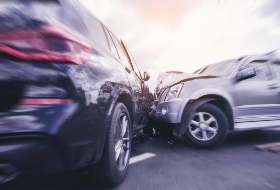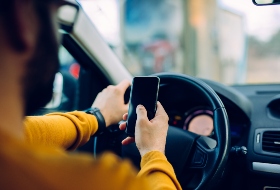Travel & Parking
Page updated: 02/06/2025

The Law for Mobile Phone Use Whilst Driving
Handheld Phones
It is illegal to use a handheld mobile phone while driving. If you’re caught using a handheld phone while driving, you’ll get six penalty points and a fine of £200. HGV and PSV drivers caught using their mobile twice or accruing 12 points on their licence will face the magistrates court.Drivers will also be referred to the traffic commissioner and could face a minimum four week suspension from professional driving.
Hands Free Phones
Hands free phone is legal, but is distracting and therefore can be dangerous. Depending upon the individual circumstances, drivers could be prosecuted for ‘failing to have proper control of the vehicle’.
Why is using a mobile phone while driving dangerous?
It is a mental distraction - driving and using your phone requires you to concentrate on two ‘thinking’ tasks at once. It is a physical distraction - holding your phone leaves only one hand in control of the steering wheel. It is a visual distraction - taking your eyes off the road creates a driving blind spot of the distance you have covered.
How does this affect my driving performance?
Much less aware of what is around you. Fail to see road signs. Fail to maintain proper lane control and steady speed. React more slowly and take longer to brake.

Check if a health condition affects your driving
You need to tell DVLA about some medical conditions as they can affect your driving.
Use the A to Z to check if you need to report your condition and find the relevant form or questionnaire.
You can be fined up to £1,000 if you do not tell DVLA about a medical condition that affects your driving.
You may be prosecuted if you’re involved in an accident as a result.
You must give up your licence if either:
- your doctor tells you to stop driving for three months or more
- you do not meet the required standards for driving because of your medical condition
In some cases, such as diabetes, there’s specific guidance for lorry, bus and coach drivers.
It’s worth pointing out that notifiable medical conditions include those which sometimes may be ‘invisible’ at first, such as anxiety, depression and post-traumatic stress disorder. Professional drivers are considered a high-risk group when it comes to mental health.

Have you had an accident in a works vehicle? Have you informed your personal insurance company?
All drivers must declare all accidents/claims to their motor insurance company. If an insurer discovers that a driver has failed to report an accident, then the driver's personal policy could be declared null and void, and they might struggle to obtain cover in the future.
It is not possible to separate your work driving activities from your private arrangements when it comes to motor insurance.
Please always take care, whether this be in your own vehicle or a Council provided vehicle.

Guidance for LGV drivers
This guidance will help you understand and comply with a few important rules and regulations around driver conduct and licensing in the haulage industry. It covers:
- Driver conduct
- Driver CPC and tachograph card
- Driver licensing and medical conditions
- Daily checks

Reversing Safety & Tips
In 2019/20, 22% of all reported collisions within the authority involved a reversing incident. The cost of these collisions amounted to approximately £22,972. If through better driving skills we can reduce that number of collisions, we can save unnecessary replacement vehicle costs, payments to third parties whose vehicles and property we damage and importantly, reduce significantly the chances of injuries to our workers and the wider general public.

How can you check how old your tyres are?
Finding out how old your tyres are is simple, as tyres manufactured after the year 2000 have a four digit code with the first two digits representing the week of manufacture and third and fourth digits representing the year.
Tyres manufactured before the year 2000 have a three digit code with the first two digits representing the week of manufacture and third digit representing the year. So 258 means week 25 of 1998.
If you are not sure about the age of your tyres, their general condition or suitability for use seek professional guidance from your tyre contractor or supplier.

Road Risk Policy
We are committed to establishing, maintaining and promoting high standards of the management of health and safety to minimise the risks to employees and others, arising from the use of motor vehicles.
The aim our Road Risk Policy is to raise awareness of occupational road risks and to reduce the associated risks to employees, Elected Members, the public, and the Council to an acceptable level.
The policy is currently in the midst of our political cycle and has not been officially released.
Documents referenced within our Road Risk Policy:


